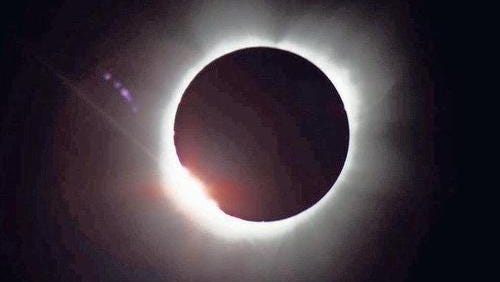Here's how to safely watch the solar eclipse
Tips to avoid eye damage
 Liv Osby
Liv OsbyThe upcoming total solar eclipse will be celebrated at restaurant viewing parties and other special events around the Upstate from the Roper Mountain Science Center to Clemson University.
But experts warn that it can lead to eye damage for those who don’t watch safely.
And now there are warnings about bogus eclipse viewers to worry about as well.

While total blindness from watching an eclipse is rare, temporary blindness and partial vision loss is possible, said Grant Brown, senior optician with the Greenville Health System Eye Institute.
“For everybody, it’s tempting to look because it’s so weird and strange,” he said. “The problem is that people want to look at it with bare eyes.”
But experts are now cautioning people to make sure the eclipse glasses or viewers they get are legitimate to prevent eye damage.
NASA has warned about the bogus viewers, Brown said. Legitimate ones will have an International Organization of Standards logo on them with the code ISO12312-2, he said.
And the American Astronomical Society provides a list https://eclipse.aas.org/resources/solar-filters of reputable vendors for these devices. They also warn that scratched, punctured or torn viewers should be discarded.
Looking at the sun at any time can damage the retina, Brown said. Normally, staring at the sun is painful, so people are unlikely to do it.
But during an eclipse, as the moon passes across the sun and it doesn’t appear as bright, it’s more tempting to sneak a peek.
Nonetheless, it can still cause permanent damage and blindness called solar retinopathy, according to the American Academy of Ophthalmology. So people should only watch with solar filters or eclipse viewers.

“Even when the sun is 99 percent covered, you’re still capable of getting damage,” Brown said. “But because it’s not painful, you won’t know it. A couple days later, you realize it’s damaged.”
A classic case of retinal sun damage involved Isaac Newton, who looked at the sun in the mirror and was blind for three days and suffered months of after-images, like spots from a camera flash, he said.
Damage can occur in minutes, he said, and most likely to be affected is central vision, which is the range for driving and TV viewing.
But Brown said he’s most concerned about children. They should be given solar filters and carefully monitored so they don’t pull them off during an eclipse, he said.
The only safe time to look at the sun is during the two- to two-and-a-half minutes of the total eclipse, he said.

“Before or after, even 1 percent of the light coming from the edges of the sun can cause a problem,” he said. “It’s the same as staring at the sun anytime.”
GHS is providing free filters beginning next week at the GHS Eye Institute, 104 Simpson St. in Greenville and at the institute’s Easley office at 109 Fleetwood Drive, he said.
The eclipse will be seen across the nation on Aug. 21, with a total eclipse visible in the Upstate from 1:07 p.m. to 4:02 p.m.
The next total solar eclipse will be in South America on July 2, 2019.
The American Academy of Ophthalmology offers these tips for watching a solar eclipse:
- Don’t use scratched or damaged solar filters.
- Follow directions that come with the solar filter or eclipse glasses.
- Help children use handheld solar viewers and eclipse glasses correctly.
- Cover your eyes with eclipse glasses or solar filters before looking at the sun and look away from the sun before removing them.
- The only time that you can look at the sun without a solar viewer is during the total eclipse.
- Never look at the uneclipsed or partially eclipsed sun through an unfiltered camera, telescope, binoculars or other similar devices.
- Consult an expert astronomer to use a special solar filter with a camera, a telescope, binoculars or any other optical device.
- Ordinary sunglasses or homemade filters are not safe for looking at the sun.